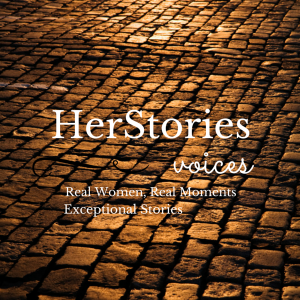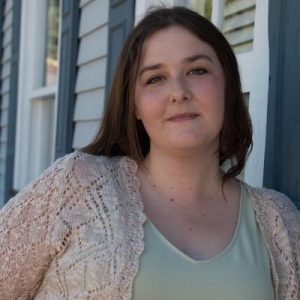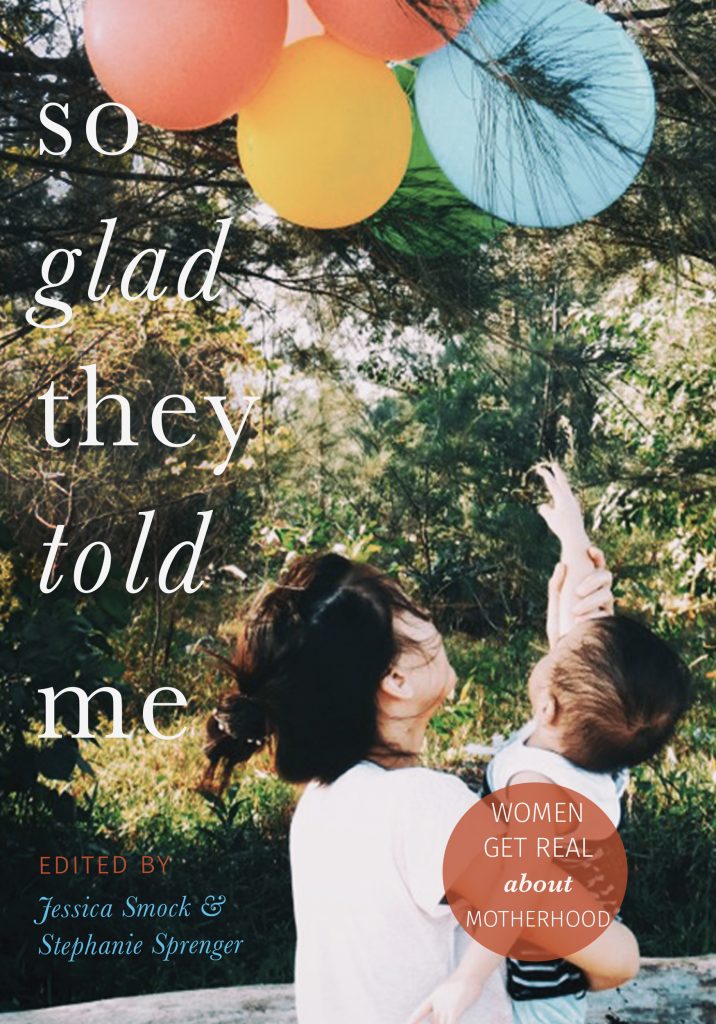This week’s essay, written by Stephanie Harper, riveted me from the start. After reading about her harrowing experience of living with a headache disorder, which is often debilitating, I’ll never again complain about having to take Advil for my tension headaches. As her essay reveals, our writer never loses her sense of humor. Her story is courageous and inspiring. I hope you enjoy. – Allie.

Girl with Headache
By Stephanie Harper
It’s 7:30 in the morning and I’m warming up with the rest of my choir, as I do on so many Sundays. It’s not a particularly notable morning. I am wearing a purple dress, Simply Vera by Vera Wang, which I bought because it sounds very impressive to say—even though I got it for $20 at Kohl’s. I like it because the fabric is naturally crinkled in a way that looks like I just rolled around in the grass, so I don’t feel the need to iron it. It’s also long enough that it reaches my knees, a major accomplishment for any garment because I am 5’11. That means I can wear it without the awkward bike shorts or leggings underneath. I’d say I feel great in my new purple crinkle dress, except that I don’t.
I woke up feeling off. Decidedly off. This in of itself isn’t totally unusual. I’ve gotten up every morning for the past 20 months with a headache, one that never goes away. One that sits behind my right eye, the way that pesky squirrel sits on the fence and stares at me, twitches in a creepy way. I hate that squirrel. I used to have recurring nightmares about that squirrel stalking me across my college campus and attacking me while I slept. That’s what this headache is like—a possibly rabid, rodent stalker. That being said, this morning’s feeling is different, something hard to put into words. It’s as though my brain is under water. Not in a gasping for air sort of way, but more like when you open your eyes to try and peer through the blue of a swimming pool. Fuzzy and distorted. Not quite right.
We start rehearsing our first song and I am looking at my music and I am seeing and reading it but I’m struggling to get the words out. It’s like my brain has been given a delayed start, a mental snow day. It’s infuriating because I like to sing and do it well but I’m flubbing all over the place. The words are so slow. My brain and my body feel so slow. My arms and legs feel as though the muscle has been replaced by jelly and I am sloshing around like one of those inflatable people that dances wildly at the entrance of a used car sale.
This is not working.
I tap my mom’s shoulder—she also sings—and then I sit down on a chair, leaving my stand and microphone erect before me. The choir sings on. My mother turns around. She lowers my stand and looks at me.
“What’s wrong?” she says, though this question is perfunctory, like “how are you?” She knows.
“We have to go,” I manage to sputter, though I can hear the words rolling off my tongue slowly, the way the smoke of a good cigar might curl.
She cocks her head. She hears it too, that slight delay. “Home?” she asks.
I think for a moment. “Hospital.”
What follows is a blur of concerned citizens rallying to get me from the worship center to the car. My mother escorts me out of the choir loft and plops me down in a leather chair in the church narthex. A friend of ours, a fellow choir lady, kneels beside me. I can tell she’s scared. Her blue eyes are alight with worry, the way a mother looks when her child has climbed just a little too high on the playset and disaster seems imminent. She talks to me, asks me a few questions, but I don’t really hear what she says. Or what I say.
I try to crack a joke with my delayed words. “Guess I haven’t had my coffee this morning.”
She smiles. “At least you never lose your sense of humor.”
My mother comes through the door. She’s pulled the car around to the front of the church for easy access. I’m ushered down the ramp by two tenors, one on either side, as though I am the Queen Mum or someone equally old and important.
As we approach my Yaris, I say, “my clown car. The guy on my right laughs. He says, “There’s already 12 people in there.” In a few minutes, my mother and I are off to the ER.
This is not the first time I’ve been to the ER since my headache started. I try not to go often, but it happens—when a flare up is particularly bad or when new symptoms emerge and something seems out of the ordinary. Like today. Sometimes I go because I have convinced myself that I’m having a stroke or an aneurysm. That there’s no way whatever is happening to me is a “normal” part of my headache discourse. Sometimes I go because I want it documented. Sometimes I go because I just don’t know what else to do.
This morning, I’m going because I’ve never had this speech problem before and it’s genuinely freaking me out. I can tell by the way my mom watches me that it’s genuinely freaked her out as well.
I have been to several ERs and met a whole slew of ER doctors and nurses. And, it’s almost always the same. I walk in the door. Sometimes I’m wearing sunglasses because my eyes are so light sensitive I can’t take them off. Sometimes, I’m leaning on my mother’s arm for support. The front desk person looks concerned. Sometimes they ask if I need a wheelchair. I always wave them off because I am stubborn and maybe a little foolish.
When I make it back to the exam room, a nurse asks me about my symptoms, my medications, all the standard questions. Then, the doctor enters. He says some version of “What brought you in today?” I explain what’s going on and try to hold off on the whole headache thing for as long as I can. But it always comes up. I’ve had a headache for three months, six months, eighteen months. I have these flares. They get bad. But this time it’s different. I’m scared. Trying to be vigilant. Just in case.
Then, the same thing happens every time. The doctor writes a few things down and pumps me full of painkillers like morphine or Dilaudid. He might put me on oxygen for a few hours. Or give me a headache cocktail of Benadryl, Haldol, and something for nausea. Every hospital has its own unique protocol. Someone always sends me home. I’m there for maybe four hours at the most. This is because I am just a girl with a headache. I don’t want to be, but I am. There is nothing anyone can do for me, no magic test or antidote. The best they can do is drug me up and hope that I sleep it off, that my headache resets to its usual nagging but bearable level by the time the drugs wear off. That’s what you do for a girl with a headache.
This trip to the ER is only slightly different. I have a CT scan, or so they tell me. I don’t remember because the Dilaudid has kicked in and I’m not present. I’m somewhere else. But everything is as normal as it always is. I’m not having a stroke or a brain aneurysm. Nobody seems to know why, on this particular day, during this particular flare up, my speech has been delayed and my motor function stunted, but they don’t seem too worried. Not out of the realm of what can be expected with headache like mine. So I go home and sleep for another four hours. Then, I go to dinner. Business as usual.
At dinner it hits me again, that weird feeling from the morning. I get up to go to the bathroom and my mom can see it too. She follows me, which is a good thing, because I open the door to the ladies’ room and then I collapse a little, fall in on myself, everything jelly again. But she’s right behind me. She helps me collect myself and I use the restroom, splash some water on my face, and then we go out to the car so I can lay down while they pay the bill. I sit down in the backseat and look at her. I ask her a question, something like “What’s going on?”
She just stares at me.
I ask her again.
“I can’t understand you” she says.
“What do you mean?” I ask her, even though her face says it all. Jibberish.
“Stephanie,” she says, putting her hand on my arm. “I swear to God, if you are doing this on purpose or because you’re just too tired to try, I’m going to kill you.”
The rest of the night continues in a similar fashion. We get home and my grandpa helps me inside, a death grip on my arm that is almost worse than the pain in my head. He lays me down on the couch in the living room. As he gets up to head home, I hear him whisper, “This is the damndest thing I’ve ever seen.”
My mom tells me I need to go to bed. We make it half way down the stairs before I black out and collapse. My dad comes and helps wrestle me to my feet. They get me to my bedroom, pulling me along like a drunk who’s lost control of her body. I wish I’d had a few drinks. It’d be a hell of a lot more fun.
My mom gets me ready for bed and tucks me in, like I’m five. “I think you just need to sleep it off,” she says. Then, she turns out the light.
About fifteen minutes later I realize I have to pee. I get up and go to the bathroom. I black out again, this time while I’m washing my hands. Mom comes to help me. She gets me on my feet and through my doorframe and I black out for a third time. Now, I’m sitting on the floor of my bedroom, staring up at her.
“Why are you doing that?” I ask her. My speech has come back a little, slurred but understandable.
“Doing what?”
“Why is your face like that?” I move my hands up and down, trying to make a dripping sort of action. Her face drips like a scoop of ice cream betrayed by heat and gravity. Neon flashes of light fly around her head. It’s freaking me out.
“What are you talking about?” She sounds concerned but also a little annoyed.
“Your face is melting.”
“We need to get you back in bed.”
This starts an argument. I want to go back to the hospital. My mental state is, in a word, goofy. Like a small child. I’m frightened and I want someone to fix it. This can’t possibly be normal. I’m going to die in my sleep. I know it. This time, it really is the end. But my mother thinks I need to sleep it off and see how I feel in the morning. She doesn’t think there’s anything to be done in the ER. We’ve already been there once today. At this point, there’s nothing left to do.
“If I die in my sleep, it will be all your fault,” I tell her, as she helps me into bed one more time.
“Then, I’ll feel bad,” she says, and moves for the door. “You have to sleep now, okay?”
“Okay,” I say and roll over onto my side. She turns the light out.
“Hey, mom?”
“Yeah?”
“Will you check on me sometime, just make sure I’m still breathing?”
“Yeah.”
I relax a little knowing she’ll check in. I settle into the covers. “I hate this.”
“I know,” she says. “Me too.”
In the morning, I feel like a new person. Or maybe not new. More like I’ve been reset. I am tired but back to my usual state of ache, my baseline just behind my right eye, where it always is. This is as close to a rebirth as I can get. And, on a morning like this, after a day like the one I’ve just had, this is good enough.
I am constantly exploring new territory with this headache disorder. Even as I write now, it’s been two-and-a-half years since the pain started. Two-and-a-half years of waking up every morning feeling a little tired and (hopefully) a little renewed. It’s not ideal, but I have found a way to make every day a new day. Each day, I have a chance to have a good day, one where I don’t get sick, I don’t need to nap, one where I can enjoy my friends, my family, my life, without too many painful consequences. And, on the days where none of this is true, where I can’t get out of bed, or my speech goes awry and I think people’s faces are melting, I can count on the newness that tomorrow will bring. And, that’s that. In this new life of mine, I’ll continue about this day and the next day to the best of my ability, with the hope that love and joy will continue to come my way in the midst of pain. That is really all I can do.
I am just a girl with a headache.
 Stephanie Harper received her Masters of Fine Arts in Creative Writing at Fairfield University with an emphasis in fiction in July 2012. Her work can be found in The Huffington Post, HelloGiggles, The Montreal Review, Poetry Quarterly, Midwest Literary Magazine, Haiku Journal, and Spry Literary Journal. She served as Fiction Co-Editor for Mason’s Road Literary Journal and is currently an editorial reader for Spry Literary Journal. She lives in Denver, CO.
Stephanie Harper received her Masters of Fine Arts in Creative Writing at Fairfield University with an emphasis in fiction in July 2012. Her work can be found in The Huffington Post, HelloGiggles, The Montreal Review, Poetry Quarterly, Midwest Literary Magazine, Haiku Journal, and Spry Literary Journal. She served as Fiction Co-Editor for Mason’s Road Literary Journal and is currently an editorial reader for Spry Literary Journal. She lives in Denver, CO.
Stephanie’s Twitter is @StephanieAHar
Stephanie’s Instagram is @StephanieAH27
Stephanie’s website is http://www.stephanie-harper.com
**Submissions for May are now open! Our theme for the month will be May, and then submissions will be closed until August as our Voices column will be on a summer hiatus. We will announce our September theme this summer, so stay tuned! For submission guidelines, read more here, and email your submission to our assistant editor, Allie, at herstoriesvoices @ gmail.com.
**Two of our most popular online writing courses, The Balanced Writer (our newest class, offered this past winter!) and Publish Your Personal Essay, are being offered as significantly discounted self-paced courses for a limited time! Just $40 each or $60 for both! Don’t miss this great deal; sign up now to treat yourself to some inspiration, polish your skills, and connect with a writing community! Details here.
Keep reading






![unnamed[1]](https://www.herstoriesproject.com/wp-content/uploads/2016/03/unnamed1.jpg)
